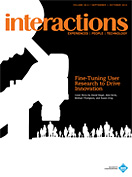Authors:
Gerrit van der Veer
The readers of interactions know what HCI stands for. That is why we subscribe to the magazine or join SIGCHI. Even though we come from a diversity of disciplines and consider ourselves practitioners, academics, students, or "just users," we agree on the importance of this young field, on the need for proper education in it, on its relevance for industry whenever design for human use is at stake, on the need for serious research, and on the requirement of multidisciplinary involvement in all of this.
In the outside world, however, the understanding of HCI among people varies, and often is totally lacking. Software engineers consider themselves to be prototypical users. A colleague of mine, a computer science professor, once stated in a staff meeting that his students "do not need to talk to people." If industry or educational authorities or funding agencies do not understand the meaning of, and need for, HCI, they will not find us and will not bother to apply our vision, knowledge, and skills.
In the U.S. there is a long tradition of considering the relationship between the computer and its users, starting with Allen Newell, Herbert Simon, and Alan Perlis at CMU. In Italy, the Artificial Intelligence Association was the original home for this, and in countries like the Netherlands and the U.K., the awareness moved from cognitive psychology to ergonomics to information sciences and industrial design. In all these examples, industry was aware of the work being done in HCI, thanks to well-established connections with the disciplines in academia. Political authorities often follow precisely these established connections. For example, for a long time, the European Commission stimulated collaboration between industry and research institutes in the HCI domain.
But sometimes things get lost: In the new European research focus, Horizon 2020, the only trace of HCI to be found is in human-robot interaction, which excludes a lot of sorely needed support for other HCI domains, such as accessible service design and usable embedded computing.
In parts of the world like Southeast Asia or Latin America, the situation is diverse, though currently a major phenomenon seems to be the divide in the understanding of HCI between academia and industry, as well as a general lack of recognition of HCI as a serious discipline. For example, in the Chinese academic world, HCI is often considered too soft for computer science, though it's offered as a major in about 15 (of more than 700) universities there.
If we let go of the real world, we will not be able to implement our mission of advancing the field. To reach out to the outside world, we will have to promote the understanding of HCI in various relevant disciplines and in different geographic regions. It should become clear that HCI is a new discipline; we should establish its legitimacy in the world, and we should speak loudly.
Societies devoted to HCI (of which SIGCHI is the largest and most powerful) should work toward this goal, testifying, as well as offering access and support to the educational and academic world, and bringing awareness to industry, including coordinated efforts to be involved in the development of standards. We also need to evangelize to governments at all levels, for which SIGCHI needs to collaborate with ACM as our legal parent.
Gerrit C. van der Veer, President, ACM SIGCHI
Copyright held by author
The Digital Library is published by the Association for Computing Machinery. Copyright © 2013 ACM, Inc.








Post Comment
@karosemena (2013 10 18)
Dear Gerrit… I’m from Latin America and totally feel connected with your thoughts. I knew about HCI 6 years ago while taking my MS in the US, and since then I’m trying to convince people at my University to take HCI as serious as any of the other computer areas. One thing that might help us over here is to have ACM to work on the translation of articles, magazines and papers. For sure we are able to find more practitioners and academics who share this passion for HCI and are willing to help on translating the information.
Regards,
Karla Arosemena (.(JavaScript must be enabled to view this email address))
Technological University of Panama